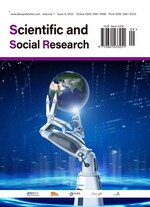Research on the Influence of Tourists’ Perceived Restorativeness of the Western Sichuan Music Linpan on Post-Visit Behavioral Intentions: The Mediating Effect of Place Attachment
Abstract
Grounded in the “Cognitive-Affect-Behavior” (CAB) theoretical framework, this study constructs a multiple mediation model to systematically investigate the impact mechanism of tourists’ restorative environment perception on post-visit behavioral intentions within rural tourism contexts. The empirical findings reveal: (1) The ecological and cultural attributes of the Linpan landscape demonstrate notable psychological resource restoration efficacy; (2) Place identity functions as the “emotional nexus” shaping tourists’ behavioral intentions; (3) Mediation effect analysis identifies a “functional-affective transformation threshold” in the transmission of restorative effects.
References
Guo YR, Zhang J, Lu SJ, et al., 2014, Structural Model and Perception Differences of Tourists’ Perceived Restorativeness of Environment. Tourism Tribune, 29(2): 93–102.
Liu C, Li SH, 2020, A Multidisciplinary Review of Restorative Natural Environment Research. Chinese Landscape Architecture, 36(1): 55–59.
Kaplan R, Kaplan S, 1989, The Experience of Nature: A Psychological Perspective. Cambridge University Press, Cambridge.
Margherita P, Rita B, Margherita B, et al., 2014, How to Measure the Restorative Quality of Environments: The PRS-11. Procedia-Social and Behavioral Sciences, 2014(159): 293–297.
Chew EYT, Jahari SA, 2014, Destination Image as a Mediator between Perceived Risks and Revisit Intention: A Case of Post-disaster Japan. Tourism Management, 2014(40): 382–393.
Pedro E, Leonor M, 2019, The Impact of Daily Tour Service Quality on Tourist Satisfaction and Behavioural Intentions in an Island Context: A Study on Tours to Isla de la Plata, Ecuador (Letter). Current Issues in Tourism, 22(19): 2337–2341.
Liu L, Wu H, 2011, Research on Influencing Factors of Tourist Satisfaction and Post-Visit Behavioral Intentions: A Case Study of Korean Group Tourists in Jiuhua Mountain. East China Economic Management, 25(11): 126–129.
Hirschman EC, Holbrook MB, 1986, Expanding the Ontology and Methodology of Research on the Consumption Experience, in Perspectives on Methodology in Consumer Research. Springer, New York, 213–251.
Pasanen TP, 2018, The Psychology of Recent Nature Visits: (How) Are Motives and Attentional Focus Related to Post-Visit Restorative Experiences, Creativity, and Emotional Well-Being? Environment & Behavior, 50(8): 913–944.
Guli ZBL, Xin ZQ, Li D, 2011, Research Progress on Place Attachment: Concepts, Theories and Methods. Journal of Capital Normal University (Social Sciences Edition), 2011(5): 86–93.
Su Q, Xin ZQ, 2010, Research on Restorative Environments: Theories, Methods, and Progress. Advances in Psychological Science, 18(1): 177–184.
Chen Y, Cao ZH, Yi LS, et al., 2024, A Review of Destination Attachment Research: Theoretical Framework and Future Prospects. Tourism Tribune, 39(8): 112–126.
Long JZ, Duan HR, Zhang FX, 2020, Research on the Influence of Place Attachment on Tourist Loyalty: An Empirical Study Based on Fenghuang Ancient Town. Journal of Beijing Normal University (Natural Science), 56(1): 68–77.
Kil N, Stein TV, Holland SM, et al., The Role of Place Attachment in Recreation Experience and Outcome Preferences among Forest Bathers. Journal of Outdoor Recreation and Tourism, 2021(35): 100410.
Maricchiolo F, Mosca O, Paolini D, et al., 2021, The Mediating Role of Place Attachment Dimensions in the Relationship Between Local Social Identity and Well-Being. Frontiers in Psychology, 2021(12): 645648.
Tsai CT, Hsu H, Chen CC, 2020, An Examination of Experiential Quality, Nostalgia, Place Attachment and Behavioral Intentions of Hospitality Customers. Journal of Hospitality Marketing & Management, 29(7): 869–885.
Sun FZ, Liu R, Ouyang CS, et al., 2020, Research on the Relationship Between Tourists’ Perceived Value and Behavioral Intentions: Based on the Perspective of Homestay Tourists. Shandong Social Sciences, 2020(1): 126–133.
Zhang H, Xu HG, 2023, Can “Scenery” Trigger “Emotion”? — The Impact of Tourism Experience Scenes and Destination Familiarity on Tourists’ Place Attachment. Tourism Tribune, 38(6): 122–135.
Huang J, Huang AM, Yang FF, et al., 2022, Tourists’ Perceived Restorativeness of Environment and Post-Visit Behavioral Intentions: Influencing Mechanisms and Boundary Conditions. Tourism Tribune, 37(2): 31–45.
Wu ML, 2003, SPSS Statistical Application Practice: Questionnaire Analysis and Applied Statistics. Science Press, Beijing.

